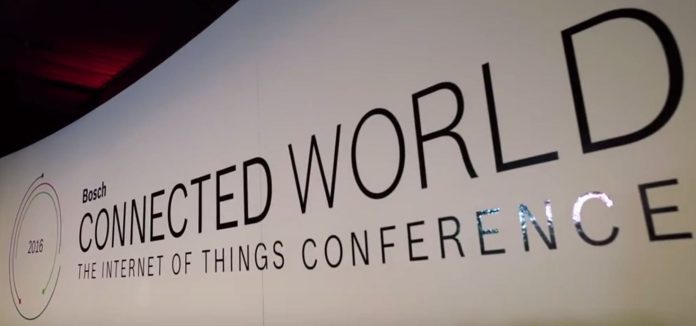Bosch hosted its Bosch Connected World conference in Chicago last week where it showed off its position within industrial IoT. The event was highlighted by news that Bosch would team with GE to bring interoperability between the two manufacturer’s IoT platforms. Partnerships were the conference’s main focus, the point being that no single company can tackle the IoT by itself.
Another main area of focus was on creating standards across an IoT system, and keeping development open to everyone.
William Ruh, SVP and CDO at GE, spoke about creating interoperability in IoT during the event’s opening keynote. He stressed that the new collaboration between GE and Bosch would bring key elements to both company’s efforts:
- Common standards to help machines and devices understand each other
- Make complementary software services available on both company’s cloud platforms
- Establish open source-based technical IoT core and jointly grow ecosystem of Eclipse Foundation
- Partner in industries where the two companies share strong domain expertise
Something attendees were urged to do by speakers at the event was to begin their IoT efforts as soon as possible, even if that means just beginning to speak about potential use cases. Joyce Mullen, vice president and GM at Dell OEM and IoT solutions, cited that by 2018, 33% of Fortune 500 companies would be disrupted by digitally-enabled competitors.
Dell and Bosch also spoke about their new partnership. The below figure shows what an IoT system looks like when made by Dell and Bosch.

Nathan Anderson, partner at Bain & Company, spoke about ways to leverage digitalization to reach an enterprise’s full potential in a session titled The Digital Disruption of Operations at Bosch Connected World 2016 in Chicago. According to Anderson, “best in class companies” do four key things well.
- Maintain focus on core value proposition
- Set digital point on horizon
- What am I trying to get out of digital? For example, I want all of my factories to be lights out in ten years.
- Implement a repeatable process for digital innovation
- Embed an operating model that reinforces the digital strategy
And companies are investing in digital for one of three reasons, Anderson said.
- Operational efficiency
- New products and services
- Improve the customer experience

The event also had speakers present a number of IoT use cases, from oil and gas to healthcare. Highlights include a panel discussion with Penske Racing and driver Will Power on how race cars use sensors to track performance and maintenance, and a session with Chris Swearingen, manager of SenseAware at FedEx, on how its device helps optimize the complex supply chains of a shipping company.

